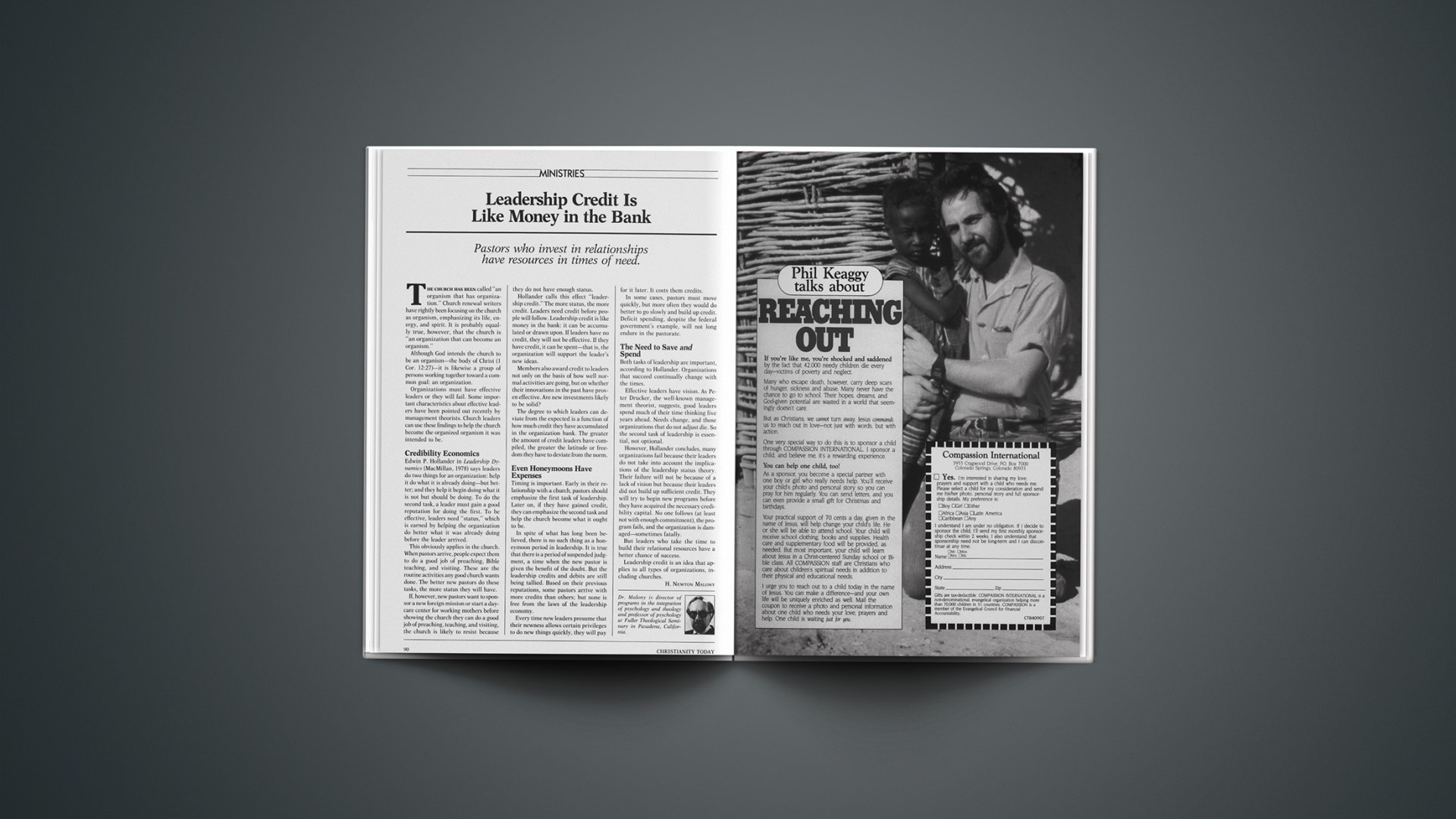Credibility Economics
Edwin P. Hollander in Leadership Dynamics (MacMillan, 1978) says leaders do two things for an organization: help it do what it is already doing—but better; and they help it begin doing what it is not but should be doing. To do the second task, a leader must gain a good reputation for doing the first. To be effective, leaders need “status,” which is earned by helping the organization do better what it was already doing before the leader arrived.
This obviously applies in the church. When pastors arrive, people expect them to do a good job of preaching, Bible teaching, and visiting. These are the routine activities any good church wants done. The better new pastors do these tasks, the more status they will have.
If, however, new pastors want to sponsor a new foreign mission or start a day-care center for working mothers before showing the church they can do a good job of preaching, teaching, and visiting, the church is likely to resist because they do not have enough status.
Hollander calls this effect “leadership credit.” The more status, the more credit. Leaders need credit before people will follow. Leadership credit is like money in the bank: it can be accumulated or drawn upon. If leaders have no credit, they will not be effective. If they have credit, it can be spent—that is, the organization will support the leader’s new ideas.
Members also award credit to leaders not only on the basis of how well normal activities are going, but on whether their innovations in the past have proven effective. Are new investments likely to be solid?
The degree to which leaders can deviate from the expected is a function of how much credit they have accumulated in the organization bank. The greater the amount of credit leaders have compiled, the greater the latitude or freedom they have to deviate from the norm.
Even Honeymoons Have Expenses
Timing is important. Early in their relationship with a church, pastors should emphasize the first task of leadership. Later on, if they have gained credit, they can emphasize the second task and help the church become what it ought to be.
In spite of what has long been believed, there is no such thing as a honeymoon period in leadership. It is true that there is a period of suspended judgment, a time when the new pastor is given the benefit of the doubt. But the leadership credits and debits are still being tallied. Based on their previous reputations, some pastors arrive with more credits than others; but none is free from the laws of the leadership economy.
Every time new leaders presume that their newness allows certain privileges to do new things quickly, they will pay for it later. It costs them credits.
In some cases, pastors must move quickly, but more often they would do better to go slowly and build up credit. Deficit spending, despite the federal government’s example, will not long endure in the pastorate.
The Need To Save And Spend
Both tasks of leadership are important, according to Hollander. Organizations that succeed continually change with the times.
Effective leaders have vision. As Peter Drucker, the well-known management theorist, suggests, good leaders spend much of their time thinking five years ahead. Needs change, and those organizations that do not adjust die. So the second task of leadership is essential, not optional.
However, Hollander concludes, many organizations fail because their leaders do not take into account the implications of the leadership status theory. Their failure will not be because of a lack of vision but because their leaders did not build up sufficient credit. They will try to begin new programs before they have acquired the necessary credibility capital. No one follows (at least not with enough commitment), the program fails, and the organization is damaged—sometimes fatally.
But leaders who take the time to build their relational resources have a better chance of success.
Leadership credit is an idea that applies to all types of organizations, including churches.
H. NEWTON MALONY
Dr. Malony is director of programs in the integration of psychology and theology and professor of psychology at Fuller Theological Seminary in Pasadena, California.










